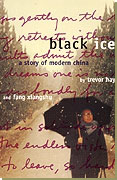Black Ice: A Story of Modern China

Black Ice is a novel set in China, a personal account of the turbulent years of Mao’s continuous revolution, including the social and political upheaval of the Cultural Revolution.
This is a Chinese story which brings to life the suffering, the adventure, the crushing losses, the unvanquished idealism of the otherwise anonymous heroes and heroines of China’s post-war period.
Black Ice tells the story of Mo Bing, from her under-cover work in Shanghai as a Communist Party cadre during the Civil War, through her denunciation and fall from grace during the Cultural Revolution to her rehabilitation and retirement in the early 1990s.
Significant parts of the story include the experience of Mo Bing’s husband as a soldier and prisoner of war during the Korean War. The Cultural Revolution, and the Red Guard movement feature strongly through Mo Bing and her son.
Life can never be exactly the same for Mo Bing and millions of her compatriots when Marshal Lin Biao, Mao’s ‘closest comrade-in-arms’ flees after being accused of attempting to assassinate Mao.
Shaken by the Cultural Revolution, as were many of her generation, Mo Bing develops as a survivor, her survival based on faith in herself, her undying idealism and her personal integrity.
With Black Ice, Trevor Hay and Fang Xiangshu continue their collaboration, building onto their earlier introduction of a distinctly Chinese aesthetic style into Australian literature.
June 1997. 182pp
Paperback, 215 x 138 mm
ISBN 0 9587718 6 3
RRP $aud 20.95
The AuthorsTrevor Hay is a senior lecturer in Literature and Cross-Cultural Studies at the University of Melbourne. He is a speaker of Mandarin Chinese and has lived and worked in China. He has continued to make regular return visits over more than twenty years.
Published works include Tartar City Woman, (Melbourne University Press, 1990), which won the Braille and Talking Book Library’s Audio Book of the Year Award in 1991.
Fang Xiangshu is a lecturer in Chinese at Deakin University. His doctoral thesis is on the Red Guard movement.
Originally from Shanghai, Fang is now an Australian citizen. He came to Australia as a visiting academic in 1984, staying until 1986. Upon his return to China, he found himself in trouble over ‘counter-revolutionary remarks’. Fang fled China and returned to Australia in 1987, where in 1990, he was granted permanent resident status on humanitarian grounds.
Trevor Hay and Fang Xiangshu wrote East Wind, West Wind (Penguin, 1992), which was well reviewed in a wide range of publications.